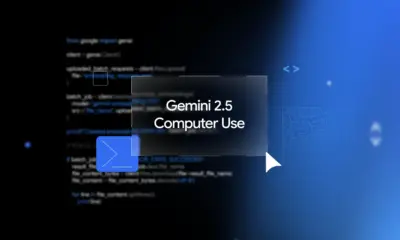Education
AI Revolutionizes Academic Research with New Language Models

Generative artificial intelligence, particularly large language models (LLMs), is significantly transforming academic research. Tools like ChatGPT, Gemini, and Claude are not only enhancing research capabilities but also presenting new challenges for students, researchers, and educators in higher education. As these technologies become more prevalent, there is an increasing need for AI literacy to navigate the associated risks and ethical considerations.
The proliferation of LLMs has been remarkable. A recent study led by a data science researcher found that at least 13.5 percent of biomedical abstracts published last year exhibited signs of AI-generated text. This marks a notable shift in how research is conducted, with LLMs now assisting in nearly every stage of the academic process.
Applications and Benefits of LLMs
LLMs can facilitate various research tasks, providing support in brainstorming ideas, designing experiments, and conducting literature reviews. They also assist in writing and debugging code, analyzing data, and synthesizing complex information. From generating hypotheses to summarizing research findings, the capabilities of these models are extensive.
Nonetheless, the integration of LLMs into academic research is not without caution. As reliance on these tools grows, concerns regarding the accuracy and ethical use of AI in research are increasingly prominent. These include issues such as misrepresentation of authorship, difficulties in replicating results, and potential biases inherent in AI-generated data.
Emerging Research Tools and Guidelines
Two primary categories of LLM-enhanced tools are emerging: AI research assistants and “deep research” AI agents. The first category includes various AI tools that assist with concept mapping, literature searches, and summarization. For example, tools like Kumu and GitMind aid in concept mapping, while Elicit and Undermind facilitate literature reviews.
On the other hand, “deep research” AI agents combine LLMs with advanced analytical frameworks to conduct thorough investigations. These tools have the potential to generate comprehensive reports that synthesize scholarly information and provide in-depth insights into complex topics. Recently, companies such as Google Gemini and Perplexity.ai launched their own deep research platforms, enhancing the landscape of academic research tools.
To ensure the responsible use of LLMs in research, several guidelines have been developed. The Government of Canada has published a guide that encourages institutions to explore generative AI while adhering to ethical frameworks. Additionally, various institutions across Canada, such as the Alberta Machine Intelligence Institute, are offering resources and education on AI literacy to enhance understanding of these tools in academic settings.
As the capabilities of LLMs continue to evolve, there is a pressing need for tailored AI literacy training for researchers. This training should address both the potential benefits and limitations of these models throughout the research process.
Academic institutions are responding to this need by developing collaborative initiatives aimed at promoting AI literacy. For instance, the vice dean of the Faculty of Graduate & Postdoctoral Studies at the University of Alberta has worked with colleagues from the University of Manitoba, University of Winnipeg, and Vancouver Island University to establish guidelines for the ethical use of generative AI in research.
The integration of LLMs in research is poised to foster interdisciplinary collaboration by breaking down traditional barriers between fields. Emerging research indicates that these models can facilitate the synthesis of data from various disciplines, thereby enhancing the potential for innovative solutions to complex problems.
In conclusion, as LLMs continue to shape the future of academic research, the responsibility lies with both institutions and researchers to navigate the ethical landscape effectively. Ensuring that guidelines are followed and that AI literacy is prioritized will be essential in harnessing the full potential of these powerful tools.

-

 Politics4 weeks ago
Politics4 weeks agoSecwepemc First Nation Seeks Aboriginal Title Over Kamloops Area
-

 World5 months ago
World5 months agoScientists Unearth Ancient Antarctic Ice to Unlock Climate Secrets
-

 Entertainment5 months ago
Entertainment5 months agoTrump and McCormick to Announce $70 Billion Energy Investments
-

 Science5 months ago
Science5 months agoFour Astronauts Return to Earth After International Space Station Mission
-

 Lifestyle5 months ago
Lifestyle5 months agoTransLink Launches Food Truck Program to Boost Revenue in Vancouver
-

 Technology3 months ago
Technology3 months agoApple Notes Enhances Functionality with Markdown Support in macOS 26
-

 Lifestyle3 months ago
Lifestyle3 months agoManitoba’s Burger Champion Shines Again Amid Dining Innovations
-

 Top Stories2 months ago
Top Stories2 months agoUrgent Update: Fatal Crash on Highway 99 Claims Life of Pitt Meadows Man
-

 Politics4 months ago
Politics4 months agoUkrainian Tennis Star Elina Svitolina Faces Death Threats Online
-

 Sports5 months ago
Sports5 months agoSearch Underway for Missing Hunter Amid Hokkaido Bear Emergency
-

 Politics5 months ago
Politics5 months agoCarney Engages First Nations Leaders at Development Law Summit
-

 Technology5 months ago
Technology5 months agoFrosthaven Launches Early Access on July 31, 2025




















